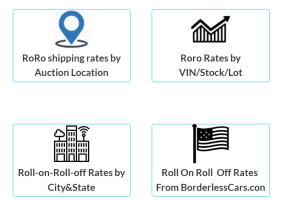Get Instant Ro-Ro Rates to Ship Car to Daikoku, Japan
Get Rates at www.alltransportdepot.com, Call 678-528-5794, or Email ship@alltransportdepot.com.
How to Ship a Car From the USA to Daikoku, Japan?
The cost of shipping a car from the USA to Daikoku, Japan range from $2,100 to $4,025. The exact ports involved, the size and condition of the car (operational autos are usually less expensive), and the shipping method (roll-on/roll-off is less expensive than a container) all play a role. It’s recommended to get in touch with All Transport Depot or use their online calculators, to receive the most accurate quote.
To get the exact cost, Click the button below:
How do I import a car from the USA to Daikoku, Japan?
Importing a car from the United States to Daikoku, Japan requires compliance with Japanese import restrictions and approval from the appropriate authorities. Whether you choose container shipment or roll-on/roll-off (RORO) shipping, work with a reliable international auto shipping firm like All Transport Depot Services to set up shipping.
When you arrive at Daikoku, prepare the required paperwork, such as the Bill of Lading and customs declaration forms, and finish the customs clearing process. All Transport Depot Services’ experience guarantees a simple and hassle-free importing procedure for your car.
Understanding the Import Regulations in Japan
Before you begin your adventure to export your car from the United States to Daikoku, you must understand Japanese import restrictions. The Japanese government has severe laws governing automobile importation, primarily to maintain environmental and safety compliance.
Overview of Japanese Import Laws
Imported vehicles in Japan must meet strict safety and environmental regulations. Your vehicle must pass an emissions test and meet Japanese safety rules. Left-hand drive automobiles may also require modifications to fulfil road requirements.
Emission Standards and Compliance
Japanese emission rules are strict, and your vehicle must meet these levels to be imported. Before shipping, make sure your vehicle fits these requirements.
Preparing Your Vehicle for Shipping
The most important phase in the process is preparing your vehicle for overseas shipping. Proper planning ensures that your vehicle makes a smooth transfer from the United States to Daikoku, Japan.
Vehicle Inspection and Maintenance
Schedule a thorough check of your vehicle before shipping to identify and address any maintenance issues. This step ensures that your vehicle arrives in excellent condition.
Required Documentation
Gather all required documentation, such as your vehicle’s title, bill of sale, and any other paperwork required by Japanese officials.
Choosing the Right Shipping Method
When shipping your car to Daikoku, you have two primary options: Roll-on/Roll-off (Ro-Ro) or container shipping.
Roll-on/Roll-off (Ro-Ro) vs. Container Shipping
Ro-Ro shipping entails driving your vehicle aboard a specialized vessel, whereas container shipping entails placing your vehicle inside a container for increased protection. When making this decision, consider your budget as well as the condition of your vehicle.
Selecting a Reliable Shipping Company
Choose a trustworthy shipping company that has handled international car transfers. Ascertain that they comprehend the Japanese import process.
Costs and Budgeting
Understanding the cost of shipping your vehicle to Daikoku is critical for good budgeting.
Shipping Costs
Shipping charges vary depending on the shipping method used, the size of the car, and the region of departure. To get the best cost, get offers from many shipping firms.
Import Duties and Taxes
Be prepared to pay import fees and taxes, which can add up quickly when bringing a car into Japan. These fees are determined by the value of your vehicle.
Scheduling and Logistics
Booking your shipping date and coordinating logistics are essential elements of successful car transportation.
Booking a Shipping Date
Schedule an appropriate shipping date with your chosen shipping company. Keep in mind peak seasons and probable delays.
Shipping Duration and Arrival
Determine the approximate shipment time and prepare for your vehicle’s arrival in Daikoku accordingly. Make preparations for customs clearance.
Clearing Customs
Navigating the customs process is essential for a smooth entry into Japan.
Customs Procedures
Follow all customs procedures to the letter. Check that all necessary documentation are in order, and be prepared for inspections.
Import Clearance
When you arrive in Daikoku, expect a clearance procedure. Customs officers in Japan will check your vehicle and apply import fees and taxes.
Getting Your Car to Daikoku
The next stage is to get your car to Daikoku after it has cleared customs.
Transportation to Your Destination
Make transportation arrangements from the port to your final location in Daikoku. Ensure that Japanese road standards are followed while in transit.
Registering Your Imported Vehicle
To ensure legality, register your imported car with the local authorities as soon as feasible.
Insurance and Safety
Driving in Japan requires you to ensure that your vehicle is safe and appropriately insured.
Vehicle Insurance in Japan
Get comprehensive auto insurance for your vehicle. Look at options that fit your demands and budget.
Safety Standards and Modifications
Determine that your car meets Japanese safety regulations and make any necessary repairs.
Driving in Japan
Driving in Japan is an unforgettable experience, complete with its own set of rules and customs.
Rules of the Road
To drive in Japan, become acquainted with the country’s traffic laws and road signs.
Adapting to Japanese Traffic
To avoid accidents and misunderstandings, adapt to Japanese driving habits and etiquette.
Maintenance and Repairs
Regular maintenance and access to dependable repair services are critical for the longevity of your car in Daikoku.
Finding Auto Service in Daikoku
Find reliable auto service providers in Daikoku who can meet your vehicle’s needs.
Language Barriers and Communication
When speaking with mechanics and service providers, be prepared for language obstacles. Consider employing translation apps to make encounters go more smoothly.
Exploring Daikoku with Your Car
After successfully importing your vehicle to Daikoku, it’s time to experience the beautiful beauty and culture of this Japanese island.
Places to Visit
Explore the stunning scenery and attractions that Daikoku has to offer.
Experiencing Japanese Culture
Immerse yourself in Japan’s rich culture and traditions while navigating Daikoku’s distinct way of life.
Community and Resources
Connecting with other expats and gaining access to helpful resources can improve your experience in Daikoku.
Connecting with Other Expats
Join expat communities or online forums to network with others who have made the move.
Online Forums and Groups
To discover useful information and assistance, use internet platforms and communities dedicated to foreigners living in Japan.
FAQs
1. How long does it take to send a vehicle from the United States to Daikoku, Japan?
Delivery timeframes vary, but are typically between 2 and 4 weeks, depending on factors such as delivery type and customs procedures.
2. What adjustments would be required for my US vehicle to meet Japanese road standards?
Headlight tweaks, speedometer conversions, and possibly changing the side of the driver’s seat are all common modifications.
3. Are there any restrictions on the types of cars that can be imported into Japan?
Yes, certain vehicles, such as older models or those with specific emission issues, may be subject to restrictions or further testing.
4. Am I permitted to bring a classic or vintage car to Daikoku, Japan?
Yes, classic and historic cars can be imported, but they must meet Japan’s import restrictions and safety criteria.
5. Is it expensive to maintain a car imported from the United States in Daikoku?
Maintenance expenses can vary, but it’s critical to select a trustworthy technician and account for changes in parts availability and labor costs.
Conclusion
Shipping a car from the United States to Daikoku, Japan is achievable but requires careful planning, attention to rules, and a complete grasp of the procedure. You can make your goal of driving your American car on Japanese roads a reality by following the steps given in this tutorial.
Connect with expat groups and internet resources for further information and specialized assistance with your car shipping adventure. Now, go out on this exciting adventure with your prized vehicle.

Kevin is a skilled auto mechanic specializing in vehicle inspections at Big Apple Auto Shippers. His thorough inspections guarantee that every car is in optimal condition before embarking on its journey. Kevin’s dedication ensures the reliability of every shipment.




